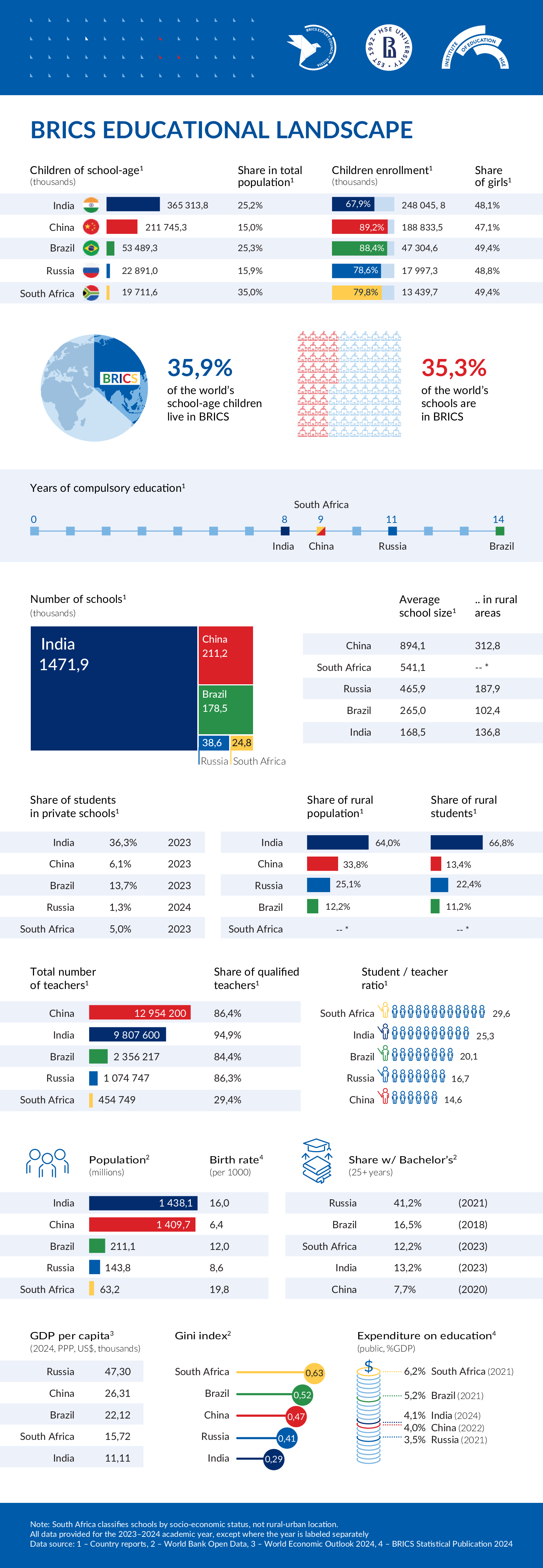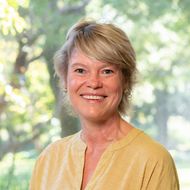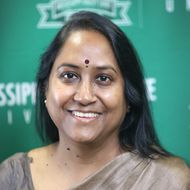Experts Assess How BRICS Countries’ Education Systems Are Evolving

The BRICS Expert Council–Russia, based at HSE University and operating in collaboration with the HSE Institute of Education, has released an analytical report titled ‘The Transformation of General Education in BRICS Countries.’ The study explores how BRICS nations are addressing shared challenges, including equitable access to schooling, digital integration, support for inclusion, linguistic diversity, and intercultural dialogue.
Education is recognised as a key driver of sustainable development, social equity, and technological progress. In the context of global transformation, education is increasingly seen as a tool for shaping the future. It is therefore vital to understand how national education systems are being shaped in countries with different historical and cultural backgrounds, yet comparable scale and aspirations. This is particularly relevant for the BRICS group—Brazil, Russia, India, China and South Africa—whose influence on the global education agenda continues to grow.
The report, prepared jointly by the BRICS Expert Council–Russia and the HSE Institute of Education, reveals how BRICS countries are taking distinct approaches to common challenges—from equalising access to school education and integrating digital technologies to addressing teacher shortages and promoting inclusion, linguistic diversity, and intercultural dialogue. It also touches on the sustainability of educational infrastructure and the evolving role of schools in fostering social cohesion.
Special attention is paid to how each country defines its strategic priorities without simply replicating external models. For example, India seeks a balance between modern labour market demands and the traditions of Vedic knowledge. South Africa’s education policy aims to overcome the legacy of segregation; meanwhile, Brazil focuses on embracing diversity as a core value. China and Russia concentrate on improving the quality and accessibility of education in remote areas.
The report underscores that BRICS education systems are advancing not in spite of their differences, but because of them. Diversity is seen not as a barrier but as a driver of growth—a foundation for developing flexible, resilient, and equitable models of education. This experience can offer valuable insights not only to BRICS members, but also to a wide range of countries seeking to rethink their approaches to schooling in light of social, cultural, and institutional realities.

BRICS education systems collectively account for roughly one-third of the global educational landscape. The accompanying infographic presents the scale and structure of school education in BRICS countries. The visual material is descriptive rather than comparative, focusing on two key dimensions:
1. The socio-economic and demographic context of each country
2. The structure of their national education systems
The presented data highlights both the diversity within the BRICS education systems and the common foundations that allow for experience sharing and idea exchange. This, in turn, helps address the mutual challenges these countries face in reforming school education.

Victoria Panova
‘The report explores the unique characteristics of the BRICS education systems,’ noted Victoria Panova, HSE Vice Rector, Head of the BRICS Expert Council–Russia. ‘Comprehensive, in-depth studies like this help us find solutions to pressing issues, promote knowledge exchange, and develop partnerships in the field of education. It is in this sphere that the diversity of BRICS countries becomes a major competitive advantage. BRICS has the potential to consolidate pioneering ideas, policy approaches, and educational experience from countries that together represent the global majority.’

Ivan Ivanov
‘This report is the first international study on the state and development of general education systems across the BRICS countries,’ explained Ivan Ivanov, Director of the Pinsky Centre of General and Extracurricular Education. ‘It emphasises the need for education policy to be adapted to local contexts while also supporting the advancement of inclusive schooling. BRICS countries play a vital role in global education and share key characteristics shaped by their distinct socio-economic and cultural conditions.’

Liesel Ebersöhn
‘Involving scholars from across the BRICS nations was key to the success of this study,’ said Liesel Ebersöhn, Director of the Centre for the Study of Resilience at the University of Pretoria. ‘The report offers compelling evidence that each country can respond to major global trends in ways that ensure positive learning and wellbeing. The contextual and cultural perspectives presented in the report demonstrate how meaningful educational practices can be developed in similar emerging economies, as well as in low- and middle-income countries.’

Vandana Saxena
‘Diversity is a defining feature of BRICS countries,’ stated Vandana Saxena, Professor at the University of Delhi (India). ‘This is reflected in national education policies and systemic efforts to expand opportunities for all citizens. Major challenges for education systems—and at the same time sources of potential—include territorial diversity, uneven population distribution, rural–urban disparities, and cultural traditions. Yet, as this study shows, governments and education systems in each BRICS country recognise the transformative power of education and are actively working to improve quality, while critically engaging with the need to support linguistic, ethnic, and religious diversity, and their intersections with gender, class, and disability.’
See also:
HSE Researchers Offer Guidance to Prevent Undergraduate Burnout
Researchers at the HSE Institute of Education have identified how much time students should ideally devote to their studies, extracurricular activities, and personal life to maintain strong academic performance without compromising their mental health. An analysis of responses from 2,753 students, combined with their actual academic results, revealed several risk factors—such as excessive homework—as well as positive factors, including sufficient sleep, regular exercise, and moderate participation in projects. Based on these findings, the researchers developed practical recommendations for both students and universities. The paper has been published in the European Journal of Education.
‘National Symbols of States Are an Integral Part of Cultural Code’
In December 2025, HSE University hosted the first Forum of the BRICS Law Schools Consortium organised by the HSE Faculty of Law. The forum brought together 42 international delegates (including 10 deans) from 14 universities in Belarus, China, South Africa, India, and Indonesia. The programme included expert discussions, the signing of cooperation agreements, and the adoption of decisions on the future areas of activity of the BRICS Law Schools Consortium, which was established at the initiative of the HSE Faculty of Law.
When a Virus Steps on a Mine: Ancient Mechanism of Infected Cell Self-Destruction Discovered
When a virus enters a cell, it disrupts the cell’s normal functions. It was previously believed that the cell's protective response to the virus triggered cellular self-destruction. However, a study involving bioinformatics researchers at HSE University has revealed a different mechanism: the cell does not react to the virus itself but to its own transcripts, which become abnormally long. The study has been published in Nature.
Researchers Identify Link between Bilingualism and Cognitive Efficiency
An international team of researchers, including scholars from HSE University, has discovered that knowledge of a foreign language can improve memory performance and increase automaticity when solving complex tasks. The higher a person’s language proficiency, the stronger the effect. The results have been published in the journal Brain and Cognition.
Lost Signal: How Solar Activity Silenced Earth's Radiation
Researchers from HSE University and the Space Research Institute of the Russian Academy of Sciences analysed seven years of data from the ERG (Arase) satellite and, for the first time, provided a detailed description of a new type of radio emission from near-Earth space—the hectometric continuum, first discovered in 2017. The researchers found that this radiation appears a few hours after sunset and disappears one to three hours after sunrise. It was most frequently observed during the summer months and less often in spring and autumn. However, by mid-2022, when the Sun entered a phase of increased activity, the radiation had completely vanished—though the scientists believe the signal may reappear in the future. The study has been published in the Journal of Geophysical Research: Space Physics.
‘Cities Are Key Actors of Interaction in the Global Arena’
The HSE Faculty of Urban and Regional Development (FURD) and India’s leading research centre, the Observer Research Foundation (ORF), have agreed to strengthen their partnership comprehensively in the study and analysis of urban development across BRICS countries. In addition, students and experts from Russia and India will take part in joint academic events and research projects.
Banking Crises Drive Biodiversity Loss
Economists from HSE University, MGIMO University, and Bocconi University have found that financial crises have a significant negative impact on biodiversity and the environment. This relationship appears to be bi-directional: as global biodiversity declines, the likelihood of new crises increases. The study examines the status of populations encompassing thousands of species worldwide over the past 50 years. The article has been published in Economics Letters, an international journal.
Scientists Discover That the Brain Responds to Others’ Actions as if They Were Its Own
When we watch someone move their finger, our brain doesn’t remain passive. Research conducted by scientists from HSE University and Lausanne University Hospital shows that observing movement activates the motor cortex as if we were performing the action ourselves—while simultaneously ‘silencing’ unnecessary muscles. The findings were published in Scientific Reports.
HSE Scientists Reveal What Drives Public Trust in Science
Researchers at HSE ISSEK have analysed the level of trust in scientific knowledge in Russian society and the factors shaping attitudes and perceptions. It was found that trust in science depends more on everyday experience, social expectations, and the perceived promises of science than on objective knowledge. The article has been published in Universe of Russia.
IDLab: Fascinating Research, Tough Deadlines, and Academic Drive
The International Laboratory of Intangible-driven Economy (IDLab) was established at the HSE campus in Perm 11 years ago. Its expertise in data processing and analysis allows researchers to combine fundamental studies with applied projects, including the development of risk and cybersecurity models for Sber. The head of the laboratory, Professor Petr Parshakov, and Senior Research Fellow Professor Mariya Molodchik spoke to the HSE News Service about IDLab’s work.


